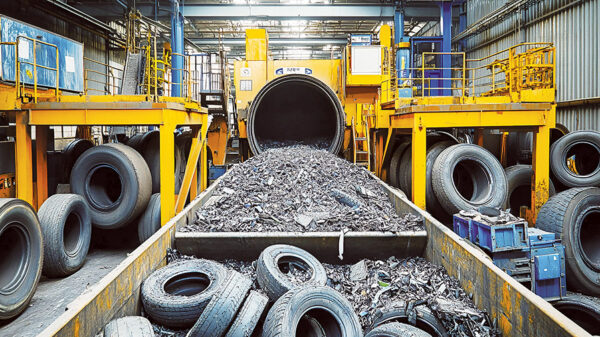by MARY M. COX
Manufacturer List
|
When catalytic converters were first installed in cars, they weren’t a valuable commodity when pulled from the auto at end of life. At the salvage yard, the catalytic converter was typically removed with a torch, or Sawzall®.
As EPA standards intensified and the converter became more complex to meet those standards, the converter platinum, palladium and rhodium content made the item more valuable. Now, a converter may be worth $100 in some markets. The tools available for removing and processing a catalytic converter have improved over time with regard to safety and efficiency.
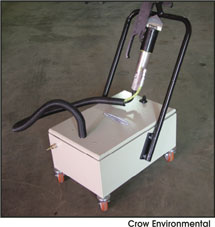
Crow Environmental offers two styles of CAT Shears to the automotive recycling industry. One is powered by compressed air and the other involves a traditional electrical set up. “What sets our shears apart from others is that they are ATEX Compliant. This means the shears meet the ATEX Safety standard for operation in an explosion zone. The area under a vehicle is considered an explosion zone because of the vapors,” stated Mason Smith, vice president, U.S. sales.
The Crow air driven unit uses the compressed air that is already accessible in most operator environments. The product has no electrical connections, so eliminates the dangerous possibility that a spark may occur. The electrical unit is specifically designed so the control for the shear is less than a volt and cannot generate a spark. Both units use a guillotine technique in cutting through the pipe.
“The guillotine cutting method, driven by a piston, does not use gears to move the blades. Therefore, rust and other debris do not fall into the gears, which prevents frequent clean outs and wear and tear on the gears, which may have otherwise resulted in machine downtime. Each unit is constructed to meet the rough conditions found in dismantling operations and blades required are inexpensive, compared to other units on the market,” Smith said.
The lightweight Holmatro CAT Cutter® is specifically designed for removing a majority of catalytic converters, including stainless steel, from recycled vehicles. The specially designed blades pull the material towards the strongest point of the cutter. “The special U-shaped scissor blades provide easier access for reaching a converter than guillotine-style cutters. Our cutter is user-friendly. It offers an ergonomic, two-hand operation and it is the safest cutter on the market.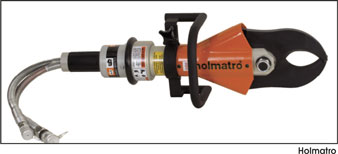
The ‘dead-man’s’ control makes accidental actuation virtually impossible. All moving parts are guarded. The dead man’s function, unlike other popular tools used to perform this function, prevents the cutter blades from being accidentally activated.
The Cutter is faster than all other traditional removal methods, making it the most efficient production method. It is also durable and cost effective compared to other traditional methods,” explained Andy Dant, sales manager.
Along with other Holmatro mobile tools, the CAT Cutter is made in the U.S. Dant continued, “The Holmatro CAT Cutter is the most productive and cost effective tool option for auto recycling in the long run.
“Compared to other tools, such as reciprocating saws, consumable and replacement costs are dramatically reduced by thousands of dollars per year – total cost, depending on how many cars are processed. With proper care and maintenance our cutter will last many, many years with only periodic blade replacements.”
Other types of mobile cutters are manufactured by Holmatro for demolition involving: steel frames, construction materials, rod material, tube profiles, wood, roots (trees), fuel pipes, heating pipes, large and small cables. The cutters can also be used in foundries for cutting risers and feeders from castings, such as aluminum, copper, brass, etc.
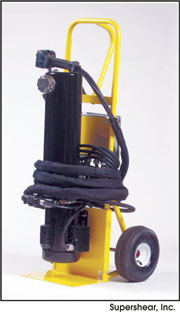
Supershear brand catalytic converter shears are “safe, economical to use, efficient and we offer the best customer service available. This is all we do. We will guide a customer through a problem until is fixed or we will resolve the problem directly, if needed. Aside from the blade and mainframe, our product is warranted for one year. Our shear blade should last 20,000 cuts with appropriate maintenance. You may need only one or two replacement blades every couple of years,” explained Larry DeMik, company owner and president. The Supershear has only one moving part – the blade. “That isn’t the case with some other products and so maintenance can sometimes be expensive, compared to the replacement cost of our blade,” he said. Also, Supershear service personnel can refurbish products for half the cost of a new replacement.
All Supershear models are “specifically designed for use by an auto recycler and the machines are especially convenient when used in conjunction with an auto rack. Our plug-in unit is stationary and our most popular model. The 12 volt Super-shear, for smaller yards, is lightweight, mobile and runs with a rechargeable battery. It can make 100 cuts before recharging is needed. Our gas engine-powered machine is completely self-contained. No electricity or battery is involved and that is often helpful in yards with a larger recycling operation. All products include the same hydraulic hose length, power capacity and blade type. Our decanner machine processes the converter. The decanner cuts the converter in half, enabling the user to easily remove the catalyst parts contained inside,” stated DeMik.
“Auto dismantling is hard work. It is often a challenge to do a tough job like that but with care – for the safety of the user, the facility or relative to other components that may be involved that are also salvageable. I believe the products we’ve offered for over 20 years are extremely helpful in that overall process,” he added.
The Vortex Cat Guillotine is manufactured in the U.S. and decans catalytic converters safely, incorporating powerful dust extraction at 200 cfm per sq.ft., throughout the process. The product will decan around 60 converters an hour and the operator is separated from the cutting process by a sliding door which locks during operation. The catalyst is collected in a bulk bag under the cutting head for easy shipping. Vortex owner Nigel Dove noted, “The machine is aimed at high volume vehicle processors, who can earn an estimated $7.24 extra per can against selling them by the piece, as part of our DR2/Vortex program. In partnering with DR2 we offer clients an agreement based program, locating decanners in any vehicle processing yard or cat reseller that processes more than 45 cats per day, with no capital outlay required from the yards.”
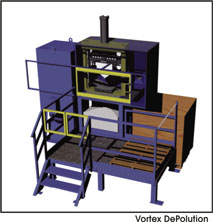
Vortex provides value based equipment solutions for processing end of life vehicles and this is the latest in their range of products. “For high throughput operators, we also offer systems to decan 300 cats per hour. Our largest machine can process 540 cats per hour. The catalytic converter market is a maze of companies offering a variety of services with the seller often left wondering if he has achieved maximum value for these valuable items. Ultimately, there are only five companies in North America that have the capability to smelt the catalyst and recover the platinum group metals inside.
Many companies ship converters around the world for processing at other facilities. We are sure in our analysis that the maximum value is achieved by removing the catalyst from the can and sending the material for assay. The next question is: What happens next with that material, if it is not smelted directly? It will probably land in the trading arena where every time it moves or changes hands, more processing cost is added, further eroding the original seller’s profit. Give us or DR2 a call, as we’d be happy to discuss the detailed ROI info we’ve prepared for your review,” Dove said.
Published in the October 2016 Edition of American Recycler News







